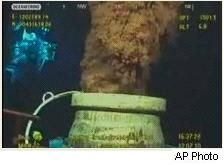 On the Gulf’s surface, all is well. Nothing to see here, move along. That will be the story for Virginia’s Chesapeake Bay and Atlantic too. But beneath, hidden damage accumulates. The Virginia pro-drilling faction has never lived with the industry. For them it is nature’s ATM; no deposit required.
On the Gulf’s surface, all is well. Nothing to see here, move along. That will be the story for Virginia’s Chesapeake Bay and Atlantic too. But beneath, hidden damage accumulates. The Virginia pro-drilling faction has never lived with the industry. For them it is nature’s ATM; no deposit required.
“Now that the oil on the surface appears to be dissipating, the notion of a recovery from the spill, repeated by politicians, strikes some here as short-sighted. The gulf had been suffering for decades before the explosion of the Deepwater Horizon rig on April 20.” – New York Times
A story out of Houma, Louisiana in the New York Times sheds light on the long term damage to the seas resulting from human activity. A little not so secret is that the oil industry is dirty. Toxic filth and waste are byproducts of every activity. Drilling and refining on land results in seepage into the groundwater and aquifer, eventually making its way to the seas. Drilling in the ocean allows the damage to be direct and immediate. For Virginia, add this to commercially overfishing menhaden and you have the formula for an economic and ecological catastrophe.
Senator Frank Wagner (R-7th), navy veteran and energy philosopher, who spearheads the McDonnell drilling lobbying effort to the benefit of American Petroleum Institute members may be inoculated against concern for human impact on the seas. As a matter of course, ships discharge trash and bilge into the blue waters, usually at some distance from the coast (not always; in Mombasa you see it going directly into the port waters, mostly swept to sea on strong tides). Those fabulous aircraft carriers are dumping the human waste and trash equivalent, the navy likes to brag, to a city of 5,000, each and every day.
“As a young Marine staff sergeant, back home after fighting in the South Pacific, (Loulan Pitre Sr) stood on barges in the gulf and watched as surplus mines, bombs and ammunition were pushed over the side.” – New York Times
Growing up, wandering the old oil fields of the El Dorado, Arkansas boom where characters like H. L. Hunt made and lost fortunes, the damage was everywhere 50 years after. Oil was discovered in 1921 while drilling for water just west of town. These were shallow wells that sprung up overnight like weeds throughout Union County. The population of towns like Smackover swelled to as many as 50,000. The derricks were wooden and the gushers flowed uncapped, filling the streams and rivers with crude. They captured what they could in pits dug with mule and manpower. Some estimates have 50% of the crude brought out of the ground lost down the streams terminating with the Mississippi River in the Gulf of Mexico. The evidence today is less apparent. Leaks and spills far out to sea are out of mind.
Working in an oil refinery, spills of all sorts were common. The waste was easy to shovel from the ground that had been covered with sand so many times that after the asphalt or crude collected, it solidified in a layer convenient for removal. We filled trucks that carried it away to a dump. Looking back, it is apparent that when we cleaned the huge tanks that held tetraethyl lead, the water went into the ground and streams. We were very careful not to poison ourselves because OSHA was ever present in a union environment, but the natural environment, oh, well.
“At least half a million barrels of oil and drilling fluids had been spilled offshore before the gusher that began after the April 20 explosion, according to government records.
Much more than that has been spilled from pipelines, vessel traffic and wells in state waters – including hundreds of spills in Louisiana alone – records show, some of it since April 20.
Runoff and waste from cornfields, sewage plants, golf courses and oil-stained parking lots drain into the Mississippi River from vast swaths of the United States, and then flow down to the gulf, creating a zone of lifeless water the size of Lake Ontario just off the coast of Louisiana.
The gulf’s floor is littered with bombs, chemical weapons and other ordnance dumped in the middle of last century, even in areas busy with drilling, and miles outside of designated dumping zones, according to experts who work on deepwater hazard surveys.” – New York Times
It is not difficult to foresee the coming creation of a similar dead zone off of Virginia Beach. The conditions here are ripe for a duplication of the damage wrought in the Gulf. While the damage will not be as evident as in Nigeria, it will build over time. Republicans have not demonstrated they really care about the legacy we are leaving to our grandchildren. That concern only applies to a deficit they can’t milk for their own short-sighted profit. What we have and are doing to the environment will have an impact well beyond the existential confines of the neo-conservative bottom-line.


![[UPDATED with Official Announcement] Audio: VA Del. Dan Helmer Says He’s Running for Congress in the Newly Drawn VA07, Has “the endorsement of 40 [House of Delegates] colleagues”](https://bluevirginia.us/wp-content/uploads/2026/02/helmermontage.jpg)















